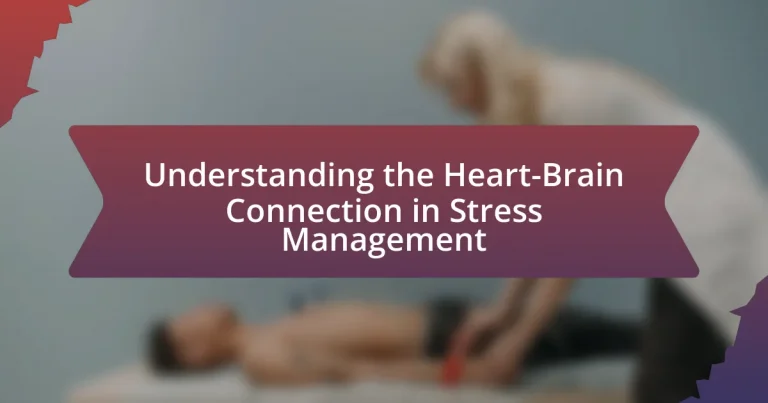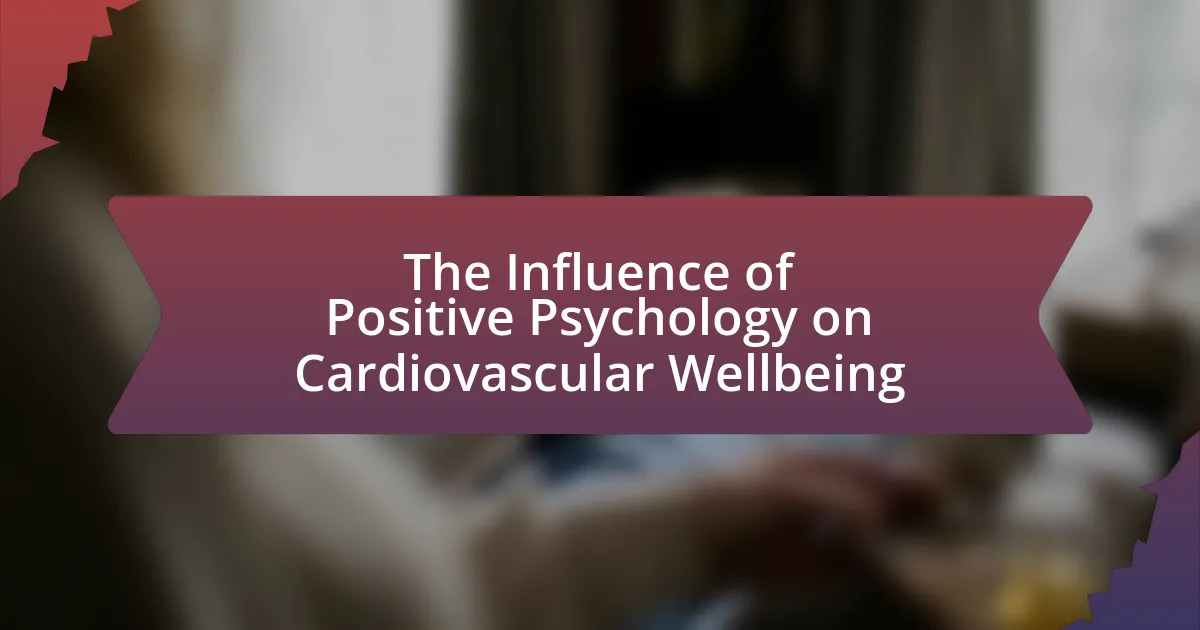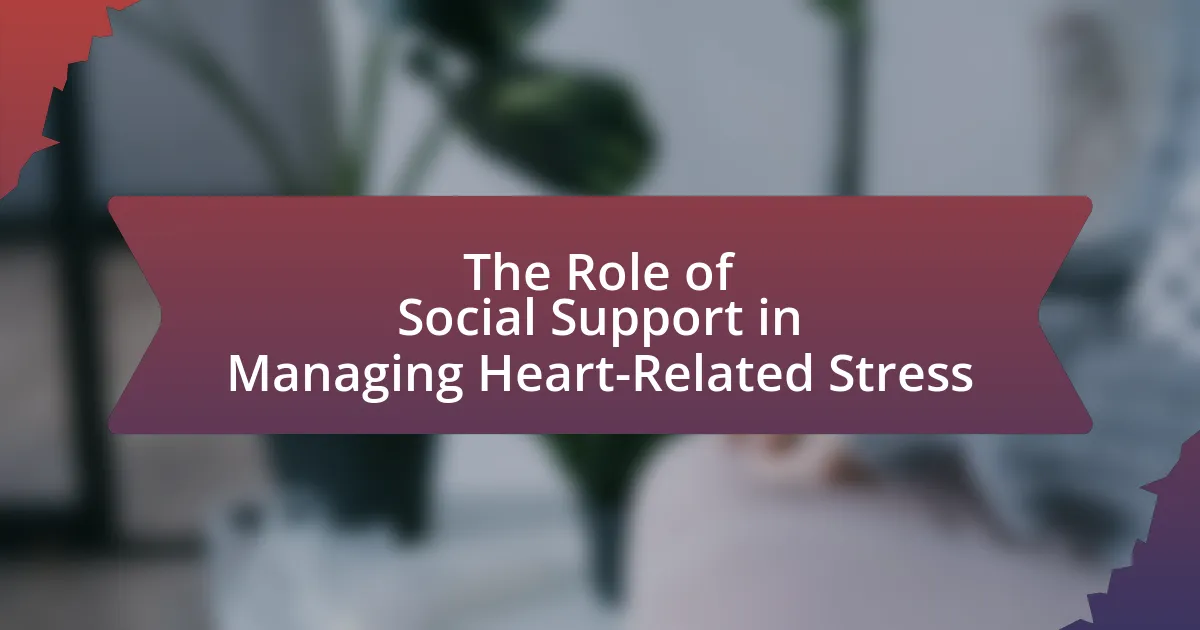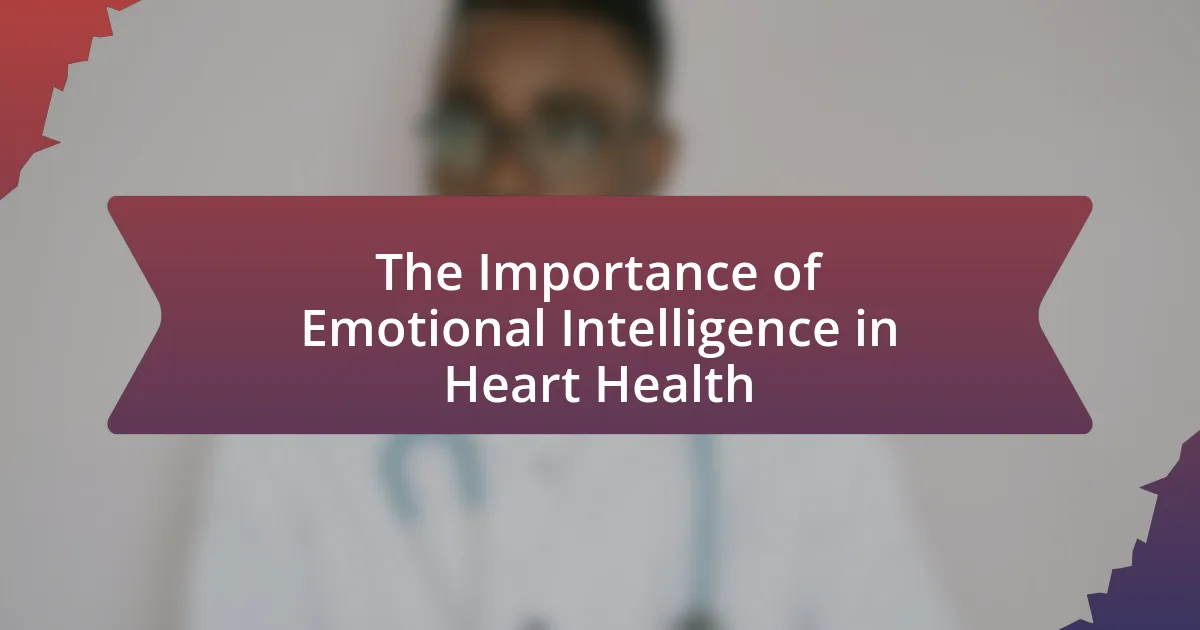The heart-brain connection in stress management refers to the complex interplay between the heart and brain in regulating emotional responses and physiological reactions to stress. This article explores how the heart communicates with the brain through neural, hormonal, and electromagnetic pathways, influencing emotional regulation and stress levels. It discusses the physiological processes involved in this communication, the impact of stress on heart and brain health, and the importance of understanding this connection for effective stress management. Additionally, it highlights techniques such as mindfulness, deep breathing, and lifestyle changes that can enhance the heart-brain connection, ultimately promoting better emotional resilience and overall well-being.
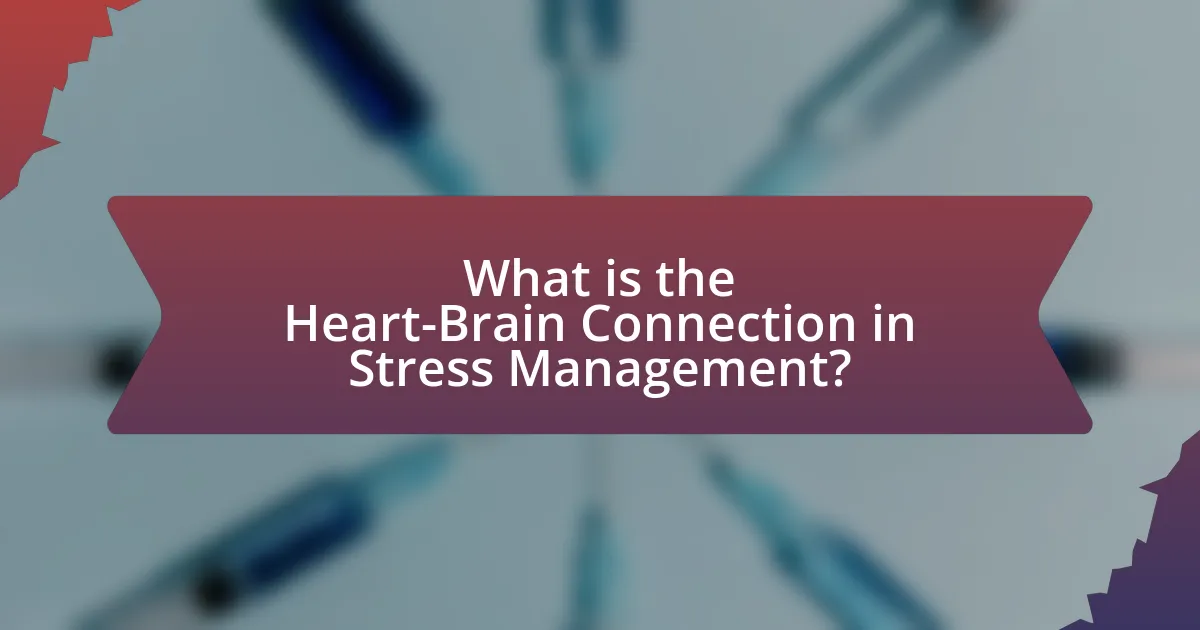
What is the Heart-Brain Connection in Stress Management?
The Heart-Brain Connection in stress management refers to the interplay between the heart and brain in regulating emotional responses and physiological reactions to stress. Research indicates that the heart communicates with the brain through neural, hormonal, and electromagnetic pathways, influencing emotional states and stress levels. For instance, studies show that heart rate variability is linked to emotional regulation; higher variability is associated with better stress management and resilience. This connection highlights the importance of practices like mindfulness and deep breathing, which can enhance heart-brain communication and improve stress responses.
How do the heart and brain communicate during stress?
The heart and brain communicate during stress primarily through the autonomic nervous system and hormonal signals. When a person experiences stress, the brain activates the sympathetic nervous system, leading to the release of stress hormones such as adrenaline and cortisol. These hormones prepare the body for a “fight or flight” response, increasing heart rate and blood pressure. Additionally, the heart sends signals back to the brain through neural pathways and baroreceptors, which help regulate the body’s response to stress. This bidirectional communication is crucial for maintaining homeostasis and managing stress effectively.
What physiological processes are involved in this communication?
The physiological processes involved in the communication between the heart and brain include neural pathways, hormonal signaling, and the autonomic nervous system’s regulation. Neural pathways facilitate direct communication through the vagus nerve, which transmits signals between the heart and brain, influencing emotional and physiological responses. Hormonal signaling, particularly through stress hormones like cortisol and adrenaline, affects heart rate and blood pressure, impacting how the brain perceives stress. The autonomic nervous system, comprising the sympathetic and parasympathetic branches, regulates heart rate variability, which is linked to emotional states and stress management. Research indicates that heart-brain interactions play a crucial role in emotional regulation and stress response, highlighting the importance of this physiological communication in overall health.
How does this connection influence emotional responses?
The heart-brain connection significantly influences emotional responses by facilitating communication between the two organs, which affects how emotions are processed and experienced. This connection operates through neural pathways, hormones, and electromagnetic signals, allowing the heart to send information to the brain that can alter emotional states. Research indicates that heart rate variability (HRV) is linked to emotional regulation; higher HRV is associated with better emotional resilience and adaptability. For instance, a study published in the journal “Frontiers in Psychology” by Thayer and Lane (2000) demonstrates that individuals with greater HRV exhibit improved emotional responses to stress, highlighting the importance of the heart-brain interaction in managing emotions effectively.
Why is understanding this connection important for stress management?
Understanding the connection between the heart and brain is crucial for effective stress management because it reveals how emotional and physiological responses are interlinked. This connection influences how stress is perceived and managed, as the brain processes stress signals that can trigger physiological reactions in the heart, such as increased heart rate and blood pressure. Research indicates that chronic stress can lead to cardiovascular issues, highlighting the importance of managing stress to maintain heart health. For instance, studies have shown that mindfulness and relaxation techniques can lower heart rate and improve emotional regulation, demonstrating the direct impact of understanding this connection on stress management strategies.
What role does the heart play in emotional regulation?
The heart plays a crucial role in emotional regulation by influencing the autonomic nervous system, which affects emotional responses. Research indicates that heart rate variability (HRV) is linked to emotional regulation; higher HRV is associated with better emotional control and resilience. Studies, such as those by Thayer and Lane (2000), demonstrate that the heart communicates with the brain through neural pathways, impacting mood and stress responses. This connection highlights the heart’s integral function in managing emotions and stress effectively.
How can brain activity affect heart function during stress?
Brain activity can significantly affect heart function during stress through the autonomic nervous system’s regulation. When an individual experiences stress, the brain activates the sympathetic nervous system, leading to the release of stress hormones like adrenaline. This hormonal surge increases heart rate and blood pressure, preparing the body for a “fight or flight” response. Research indicates that chronic stress can lead to long-term cardiovascular issues, as sustained sympathetic activation can contribute to heart disease. For instance, a study published in the Journal of the American College of Cardiology found that individuals with high stress levels had a 27% increased risk of heart disease. Thus, the interplay between brain activity and heart function during stress is crucial for understanding cardiovascular health.
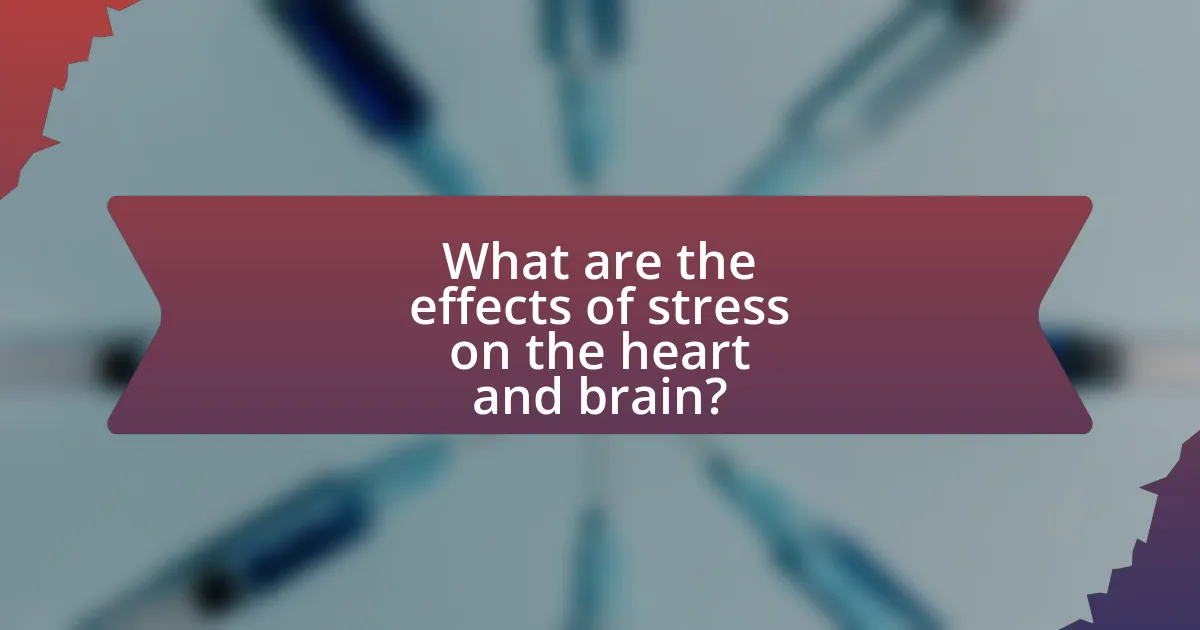
What are the effects of stress on the heart and brain?
Stress negatively impacts both the heart and brain by increasing the risk of cardiovascular diseases and impairing cognitive functions. Chronic stress leads to elevated levels of cortisol, which can cause inflammation and damage to blood vessels, ultimately resulting in hypertension and heart disease. Additionally, stress can contribute to anxiety and depression, which are linked to cognitive decline and memory issues. Research indicates that individuals experiencing high stress levels are more likely to suffer from heart attacks and strokes, as stress triggers the release of adrenaline, increasing heart rate and blood pressure. Furthermore, studies show that prolonged stress can lead to structural changes in the brain, particularly in areas responsible for memory and emotional regulation, such as the hippocampus and prefrontal cortex.
How does chronic stress impact heart health?
Chronic stress negatively impacts heart health by increasing the risk of cardiovascular diseases. Prolonged exposure to stress hormones, such as cortisol, leads to elevated blood pressure, increased heart rate, and inflammation, all of which contribute to heart disease. Research indicates that individuals experiencing chronic stress are more likely to develop conditions like hypertension and coronary artery disease, as evidenced by a study published in the Journal of the American College of Cardiology, which found that stress management interventions significantly reduced cardiovascular risk factors in participants.
What are the long-term consequences of stress on cardiovascular function?
Long-term stress has significant negative consequences on cardiovascular function, including increased risk of hypertension, heart disease, and stroke. Chronic stress leads to elevated levels of cortisol and adrenaline, which can cause persistent increases in heart rate and blood pressure. Studies indicate that individuals experiencing prolonged stress are more likely to develop atherosclerosis, a condition characterized by the hardening of arteries due to plaque buildup, which can ultimately result in heart attacks. Furthermore, research published in the Journal of the American College of Cardiology highlights that stress-induced inflammation can damage blood vessels and contribute to cardiovascular events.
How does stress contribute to the development of heart disease?
Stress contributes to the development of heart disease by triggering physiological responses that can lead to increased blood pressure, inflammation, and changes in heart rate. When an individual experiences stress, the body releases hormones such as cortisol and adrenaline, which prepare the body for a “fight or flight” response. This response can cause blood vessels to constrict, leading to elevated blood pressure. Chronic stress can result in persistent high blood pressure, which is a significant risk factor for heart disease.
Additionally, stress can promote unhealthy behaviors such as poor diet, physical inactivity, smoking, and excessive alcohol consumption, further increasing the risk of heart disease. Research indicates that individuals with high levels of stress are more likely to develop coronary artery disease and experience heart attacks. A study published in the Journal of the American College of Cardiology found that psychological stress is associated with a 50% increase in the risk of cardiovascular events. Thus, the connection between stress and heart disease is well-established through both physiological mechanisms and behavioral changes.
What cognitive effects does stress have on the brain?
Stress negatively impacts cognitive functions in the brain, leading to impairments in memory, attention, and decision-making. Chronic stress elevates cortisol levels, which can damage the hippocampus, a region critical for memory formation. Research indicates that prolonged exposure to stress can result in reduced neurogenesis and synaptic plasticity, further hindering cognitive abilities. A study published in the journal “Nature Reviews Neuroscience” by McEwen (2007) highlights how stress-induced changes in brain structure and function can lead to difficulties in learning and memory retention.
How does stress affect memory and decision-making?
Stress negatively impacts memory and decision-making by impairing cognitive functions and altering brain chemistry. High levels of stress lead to the release of cortisol, which can disrupt the formation of new memories and hinder the retrieval of existing ones. Research indicates that chronic stress can shrink the hippocampus, a brain region critical for memory, thereby reducing overall cognitive performance. Additionally, stress can lead to impulsive decision-making, as it affects the prefrontal cortex, which is responsible for rational thought and planning. Studies have shown that individuals under stress are more likely to make choices based on immediate rewards rather than long-term consequences, further illustrating the detrimental effects of stress on cognitive processes.
What are the neurological changes associated with prolonged stress?
Prolonged stress leads to significant neurological changes, including alterations in brain structure and function. Chronic stress is associated with increased levels of cortisol, which can result in hippocampal atrophy, impairing memory and learning. Additionally, prolonged stress can enhance amygdala activity, heightening emotional responses and anxiety. Research indicates that these changes can disrupt neural connectivity and lead to cognitive decline, as evidenced by studies showing that individuals with chronic stress exhibit reduced gray matter volume in key brain regions.
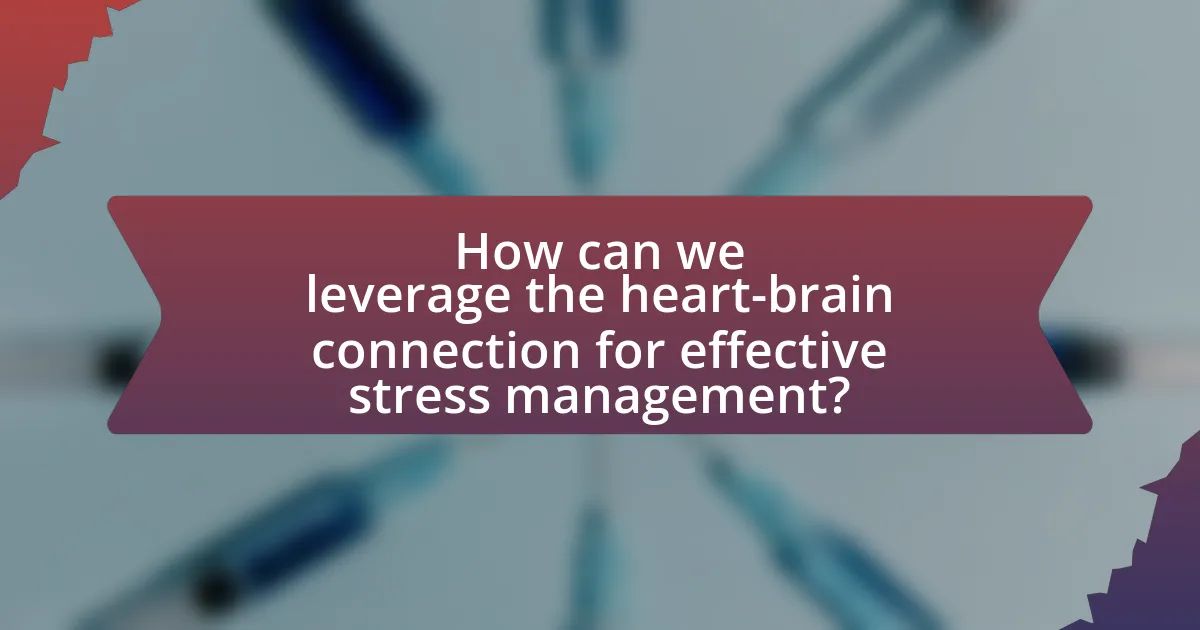
How can we leverage the heart-brain connection for effective stress management?
We can leverage the heart-brain connection for effective stress management by utilizing techniques that promote coherence between heart rhythms and brain activity. Research indicates that practices such as heart-focused breathing and mindfulness can enhance heart rate variability, which is associated with reduced stress levels and improved emotional regulation. For instance, a study published in the journal “Frontiers in Human Neuroscience” by McCraty and Shaffer (2015) demonstrates that heart coherence techniques can lead to significant reductions in stress and anxiety, highlighting the physiological link between heart function and emotional states. By consciously engaging in these practices, individuals can foster a more balanced interaction between their heart and brain, ultimately leading to better stress management outcomes.
What techniques can enhance the heart-brain connection?
Techniques that can enhance the heart-brain connection include mindfulness meditation, deep breathing exercises, and biofeedback. Mindfulness meditation has been shown to improve emotional regulation and reduce stress, which positively affects the heart-brain connection by fostering a state of calm and focus. Deep breathing exercises stimulate the vagus nerve, promoting heart rate variability and enhancing communication between the heart and brain. Biofeedback, which involves using real-time data to gain awareness and control over physiological functions, can also strengthen this connection by allowing individuals to consciously influence their heart rhythms and emotional states. Research indicates that these techniques can lead to improved mental clarity and emotional resilience, thereby reinforcing the heart-brain connection.
How does mindfulness meditation influence this connection?
Mindfulness meditation enhances the heart-brain connection by promoting emotional regulation and reducing stress responses. Research indicates that mindfulness practices can lower cortisol levels, which are associated with stress, thereby improving heart rate variability (HRV). A study published in the journal “Psychosomatic Medicine” by Turakitwanakan et al. (2013) found that participants who engaged in mindfulness meditation exhibited significant improvements in HRV, indicating better autonomic regulation and a more resilient heart-brain connection. This suggests that mindfulness meditation not only fosters mental clarity but also supports cardiovascular health by mitigating the physiological effects of stress.
What role does deep breathing play in stress reduction?
Deep breathing plays a crucial role in stress reduction by activating the body’s relaxation response. This physiological process lowers heart rate and blood pressure, counteracting the stress-induced fight-or-flight response. Research indicates that deep breathing techniques can significantly decrease levels of cortisol, a hormone associated with stress, thereby promoting a sense of calm and well-being. A study published in the Journal of Clinical Psychology found that participants who practiced deep breathing reported lower anxiety levels and improved mood, demonstrating its effectiveness in managing stress.
What lifestyle changes can support heart-brain health?
Regular physical activity, a balanced diet, stress management, and adequate sleep are lifestyle changes that can significantly support heart-brain health. Engaging in at least 150 minutes of moderate aerobic exercise weekly can improve cardiovascular health and cognitive function. A diet rich in fruits, vegetables, whole grains, and omega-3 fatty acids, such as those found in fish, has been linked to reduced risk of heart disease and improved brain health. Effective stress management techniques, including mindfulness and meditation, can lower cortisol levels, which, when elevated, negatively impact both heart and brain health. Additionally, obtaining 7-9 hours of quality sleep per night is essential, as sleep deprivation is associated with increased risk of cardiovascular issues and cognitive decline.
How does regular exercise benefit the heart-brain connection?
Regular exercise enhances the heart-brain connection by improving cardiovascular health and promoting neuroplasticity. Engaging in physical activity increases blood flow to the brain, which supports cognitive functions and emotional regulation. Research indicates that exercise stimulates the release of neurotrophic factors, such as Brain-Derived Neurotrophic Factor (BDNF), which is crucial for the growth and survival of neurons. A study published in the journal “Frontiers in Human Neuroscience” by Ratey and Loehr (2011) highlights that regular aerobic exercise can lead to improved mood and reduced anxiety, thereby strengthening the heart-brain connection.
What dietary choices promote better stress management?
Dietary choices that promote better stress management include consuming foods rich in omega-3 fatty acids, antioxidants, and vitamins B and D. Omega-3 fatty acids, found in fatty fish like salmon and walnuts, have been shown to reduce anxiety and improve mood by influencing neurotransmitter function. Antioxidant-rich foods, such as berries and leafy greens, combat oxidative stress, which can exacerbate feelings of anxiety. Additionally, vitamins B and D play crucial roles in brain health; for instance, vitamin B6 is essential for serotonin production, while vitamin D deficiency has been linked to increased stress levels. Research indicates that a balanced diet incorporating these nutrients can significantly enhance emotional resilience and overall mental well-being.
What practical strategies can individuals implement for stress management?
Individuals can implement several practical strategies for stress management, including regular physical exercise, mindfulness meditation, and effective time management. Regular physical exercise, such as aerobic activities, has been shown to reduce stress hormones and trigger the release of endorphins, which improve mood and promote relaxation. Mindfulness meditation helps individuals focus on the present moment, reducing anxiety and enhancing emotional regulation, as supported by research published in the journal “Psychological Science,” which found that mindfulness practices can significantly lower stress levels. Effective time management techniques, such as prioritizing tasks and setting realistic goals, can alleviate feelings of being overwhelmed, thereby reducing stress. These strategies collectively contribute to a healthier heart-brain connection, promoting overall well-being.
How can one create a personalized stress management plan?
To create a personalized stress management plan, one should first assess individual stressors and coping mechanisms. This involves identifying specific triggers, such as work pressure or personal relationships, and evaluating current responses to stress, like exercise or meditation. Research indicates that personalized approaches, which consider unique circumstances and preferences, are more effective; for instance, a study published in the Journal of Health Psychology found that tailored interventions significantly reduce stress levels compared to generic strategies. Following this assessment, individuals can select techniques that resonate with them, such as mindfulness practices, physical activity, or time management strategies, ensuring the plan aligns with their lifestyle and preferences. Regularly reviewing and adjusting the plan based on effectiveness and changing circumstances further enhances its relevance and efficacy.
What are some common pitfalls to avoid in stress management?
Common pitfalls to avoid in stress management include neglecting physical health, relying solely on avoidance strategies, and failing to establish a support system. Neglecting physical health can exacerbate stress, as studies show that regular exercise and proper nutrition significantly improve mental well-being. Relying solely on avoidance strategies, such as procrastination or substance use, can lead to increased anxiety and unresolved issues. Additionally, failing to establish a support system can leave individuals feeling isolated, which research indicates can worsen stress levels and hinder effective coping mechanisms.
